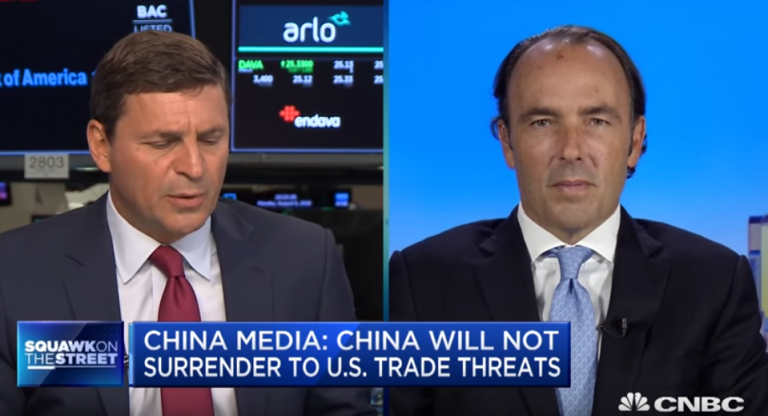Even as worries abound about the ongoing U.S.-China trade war, Hedge fund manager Kyle Bass, founder of Hayman Capital Management, believes that the U.S. government is taking a logical course of action.
In an August 6 interview with CNBC Exclusive, Bass said that China has been stealing hundreds of billions of dollars’ worth of intellectual property from U.S. companies, and has been using its economic might to spread its political influence across Asia and other parts of the world.
For these reasons, placing more tariffs on Chinese goods, particularly those that compete in the high-tech industry, is a matter of sound policy.
“What we’re trying to do is counterbalance China’s offensive,” Bass told CNBC. He described China’s “offensive” as economic strength translated into geopolitical coercion, giving examples such as Beijing’s using heavy loans to bring smaller countries into its orbit, and the Chinese military’s heightened aggression in the South China Sea.

Placing more tariffs on Chinese goods, particularly those that compete in the high-tech industry, is a matter of sound policy. (Image: pixabay / CC0 1.0)
In the 1970s, the United States and China developed warmer relations in order to counter the Soviet Union, which gave China an ample opportunity to attract Western investment and build its economy. The United States afforded China favored nation status, which became permanent around the turn of the century.
Success
You are now signed up for our newsletter
Success
Check your email to complete sign up
But even as China became the world’s second-biggest economy, Beijing has insisted on strict protectionism, making it hard for foreign companies to do business in China without first accepting heavy fees and other controls. Much of the know-how that China’s electronics industry relies on was acquired in forced technology transfers by foreign firms as a condition for them being able to operate in China.
“We haven’t pushed back since Kissinger and Nixon pivoted to China to counterbalance Russia in the early 1970s,” Bass said. “I know that’s a really long time continuum, but it’s important for us to try to level the playing field a little bit here.”

But even as China became the world’s second-biggest economy, Beijing has insisted on strict protectionism, making it hard for foreign companies to do business in China without first accepting heavy fees and other controls. (Image: pixabay / CC0 1.0)
Ending the multibillion-dollar trade imbalance between China and the United States was a major campaign point prior to the 2016 election of U.S. President Donald Trump. Since the first tariffs were announced in July, Trump has responded to Beijing’s criticism by promising additional tariffs on up to US$500 billion of Chinese imports.
China has responded with its own tariffs, but because American imports to China are dwarfed by goods going the other way around, Beijing has much more to lose in a full-on trade war. The communist leadership could also suffer from political unrest if its economy continues to decline.
“It’s all rooted in… their strong basis in the globe economically,” Bass said. “And literally we’re just pushing back a little bit.”
Follow us on Twitter or subscribe to our weekly email
















